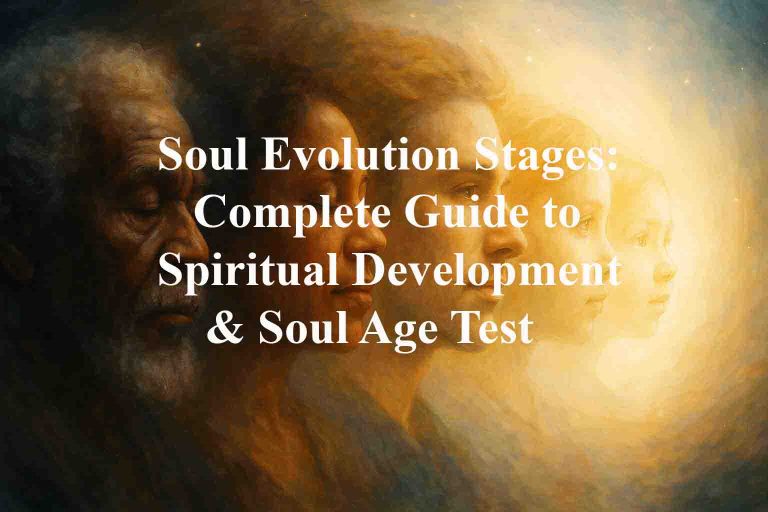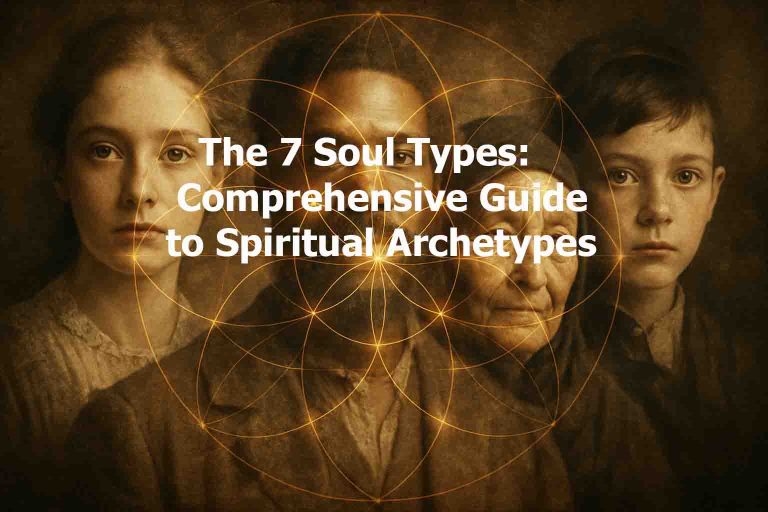Young Soul Characteristics: 11 Signs Of Material-Focused Spirit
Discover the distinctive traits, gifts, and challenges of the young soul stage in spiritual evolution, where consciousness focuses on achievement, material mastery, and individual power development for collective advancement.
The young soul stage represents one of the most dynamic and influential phases in spiritual evolution, characterized by intense focus on individual achievement, material success, and mastery of physical reality. Understanding young soul characteristics provides profound insight into the driving forces behind much of human progress, innovation, and civilization building.
Young souls comprise approximately 35% of Earth’s current population, making their energy and values particularly influential in shaping contemporary culture, economics, and social structures. Their achievement-oriented nature drives most technological advancement, entrepreneurial success, and competitive excellence that advances human civilization.
Unlike the structure-seeking baby soul stage or the relationship-focused mature soul stage, young souls concentrate on developing individual power and capability through tangible achievement and material mastery. This focus serves essential evolutionary purposes by teaching lessons about personal responsibility, goal manifestation, and effective use of individual will.
The young soul stage typically spans many lifetimes as souls learn to balance ambitious achievement with consideration for others, develop confidence without arrogance, and master material reality while beginning to recognize deeper life meanings. This developmental process creates the foundation for subsequent emotional and spiritual growth stages.
Understanding young soul characteristics helps explain many contemporary phenomena, from the entrepreneurial spirit driving technological innovation to the competitive nature of modern society. Rather than judging these traits, recognizing their evolutionary purpose cultivates appreciation for this essential developmental stage.
This comprehensive exploration will guide you through eleven distinctive young soul characteristics, helping you recognize these traits in yourself and others while understanding their gifts, challenges, and role in spiritual evolution. Whether you identify with young soul energy or interact with young souls regularly, this framework provides valuable insight for navigating these dynamic relationships.
Table of Contents
Understanding the Young Soul Stage in Spiritual Evolution
The young soul stage occupies the third position in the seven-stage spiritual evolution framework, representing a crucial transition from external rule-following to internal power development. Young souls have typically completed baby soul lessons about working within established systems and now focus on developing individual capability and achievement.
This evolutionary position explains much about young soul behavior and priorities. Having learned basic social cooperation during the baby soul stage, young souls now concentrate on developing personal power, individual identity, and material mastery. They’ve outgrown the need for external authority to provide structure but haven’t yet developed interest in the emotional depth that characterizes mature souls.
The developmental purpose of the young soul stage involves learning to manifest desired outcomes through individual effort, developing confidence and competence in material reality, understanding personal responsibility for life circumstances, and beginning to balance individual achievement with consideration for others’ needs and collective welfare.
Young souls typically incarnate in environments that provide opportunities for achievement and advancement, including competitive societies, entrepreneurial cultures, rapidly developing civilizations, and circumstances where innovation and individual accomplishment are valued and rewarded. These environments support their developmental goals while providing appropriate challenges.
The average duration of the young soul stage spans numerous lifetimes, as souls work to master material reality, develop individual power, and learn to use achievement drive constructively. Some souls advance through this stage relatively quickly, while others require extensive experience to integrate all young soul lessons before progressing to mature soul development.
Current estimates suggest young souls comprise the largest single group in Earth’s population at approximately 35%, heavily concentrated in developed countries where competitive achievement and material success are highly valued. This demographic dominance explains much of the achievement-oriented nature of modern civilization and contemporary cultural values.
The young soul’s impact on modern civilization cannot be overstated. Most technological advancement, entrepreneurial innovation, economic development, scientific progress, and competitive achievement that characterizes contemporary society stems from young soul energy channeled toward material mastery and individual accomplishment.
For comprehensive understanding of young soul placement within complete spiritual development, see our detailed guide to Spiritual Evolution Stages: The 7 Levels of Soul Development, which provides context for young soul characteristics within the broader framework of consciousness development.
Young Soul Characteristic #1: Achievement Orientation
The driving need to accomplish, succeed, and achieve tangible results represents perhaps the most fundamental young soul characteristic. This achievement orientation provides the motivational force that drives young souls to overcome obstacles, pursue ambitious goals, and create measurable success in material reality.

Young soul achievement focus manifests across multiple life areas, including career advancement and professional success, financial accumulation and material acquisition, competitive excellence in sports, arts, or intellectual pursuits, educational achievement and skill development, social status advancement and recognition, and personal goal accomplishment and self-improvement projects.
The positive aspects of achievement orientation include remarkable goal-setting and strategic planning abilities, persistence and determination in pursuing objectives, willingness to work hard and make sacrifices for success, capacity to overcome obstacles and learn from failures, and drive that creates much of human progress and innovation.
However, achievement orientation can become imbalanced when success becomes the sole measure of self-worth, when competitive drive overwhelms consideration for others, when material accumulation replaces deeper life meaning, when perfectionism creates chronic dissatisfaction, or when achievement addiction prevents enjoyment of present moments.
Famous examples of healthy achievement orientation include successful entrepreneurs who build companies that benefit society, athletes who inspire excellence while displaying good sportsmanship, scientists whose achievement drive leads to discoveries that advance human knowledge, and artists whose success creates beauty and meaning for others.
The evolutionary purpose of achievement orientation teaches young souls essential lessons about personal responsibility, goal manifestation, and the proper use of individual will. These skills provide foundation for subsequent spiritual development stages that require capability and confidence for emotional and spiritual growth.
Balancing achievement orientation involves maintaining perspective on success as means rather than ends, developing appreciation for process alongside results, cultivating consideration for others affected by achievement pursuits, and beginning to explore deeper meanings beyond material accomplishment.
Recognition of achievement orientation in yourself or others includes observing intense goal focus and strategic planning, competitive drive and desire to excel, material success seeking and status consciousness, persistence in overcoming obstacles, and frequent measurement of progress and results.
Young Soul Characteristic #2: Material Focus
The intense focus on physical wealth, tangible possessions, and material success represents a defining characteristic of young soul consciousness. This material orientation serves important evolutionary purposes by teaching lessons about manifestation, abundance, and mastery of physical reality.

Young soul material focus manifests through strong desire for financial wealth and security, appreciation for quality possessions and status symbols, investment in real estate, vehicles, and luxury items, enjoyment of material comfort and convenience, interest in fashion, beauty, and physical presentation, and measurement of success through tangible accumulation.
The positive aspects of material focus include development of manifestation skills and abundance consciousness, appreciation for quality and beauty in physical forms, motivation to create wealth that can serve others, understanding of economic systems and material resource management, and drive that builds economic prosperity and material civilization.
The relationship between material focus and economic development cannot be overstated. Young soul energy drives most entrepreneurial activity, business innovation, economic growth, technological advancement, and material progress that characterizes modern civilization. Without young soul material drive, human society would lack motivation for economic advancement.
However, material focus becomes problematic when possessions become the primary source of identity and self-worth, when materialism replaces consideration for relationships and meaning, when excessive consumption creates environmental or social harm, when financial acquisition becomes compulsive or unethical, or when material attachment prevents spiritual growth.
Cultural expressions of young soul materialism include consumer culture and advertising that emphasizes status and acquisition, fashion and luxury industries that create desire for material beauty, real estate and investment markets that focus on material accumulation, entertainment that celebrates wealth and material success, and social media that displays material achievements.
Balancing material focus involves appreciating material beauty without attachment, using wealth to serve others and meaningful purposes, developing non-material sources of identity and fulfillment, cultivating gratitude for existing abundance, and beginning to explore values beyond material accumulation.
The evolutionary purpose of material focus teaches young souls important lessons about manifestation, abundance, and working effectively with physical reality. These skills provide practical foundation for subsequent development stages that require material security and confidence for emotional and spiritual exploration.
⭐ DISCOVER YOUR COMPLETE TRI-DIMENSIONAL BLUEPRINT ⭐
Branch out with our ‘Weekly Wisdom from the Tree’ newsletter, then unlock your personalized 15+ page analysis revealing how all three pathways integrate as YOUR unique combination type:
🔮 Your Enneagram Type – How you move through the world
🌟 Your Soul Type – Why you’re here and your spiritual purpose
⚡ Your Healing Pathway – Your natural healing gifts and energetic sensitivities
No more exploring in fragments. Get your complete roadmap – one of 189 unique combinations – showing exactly how your personality patterns, soul purpose, and healing gifts work together to create the real you.
Young Soul Characteristic #3: Competitive Nature
The strong drive to compete, win, and outperform others represents a central aspect of young soul consciousness that serves important evolutionary purposes while creating both individual growth and collective advancement. This competitive nature helps develop individual power and capability while driving excellence and innovation.

Young soul competitive drive manifests through intense desire to win in sports, games, and contests, career competition and professional advancement seeking, academic competition and educational achievement, social competition for status and recognition, business competition and market success, and personal competition to improve skills and abilities.
The positive aspects of competitive nature include motivation to excel and achieve higher standards, drive that pushes personal and collective boundaries, willingness to take risks and embrace challenges, development of resilience and determination, innovation that emerges from competitive pressure, and inspiration that encourages others to improve their performance.
Competition serves evolutionary development by forcing individuals to develop their capabilities, discover their potential, overcome limitations and fears, learn from defeat and setbacks, and build confidence through earned success. Without competitive pressure, many young souls would not develop their full potential or contribute their maximum gifts.
The shadow aspects of excessive competition include winning-at-all-costs mentality that disregards ethics, aggressive behavior that harms relationships, inability to celebrate others’ success, chronic stress from constant competitive pressure, and development of enemies rather than collaborative relationships.
Learning cooperation within competitive frameworks represents an important young soul developmental task. This involves maintaining competitive excellence while developing sportsmanship, competing against previous personal performance rather than only against others, finding ways to elevate all participants through competition, and using competitive success to serve larger purposes.
The evolutionary purpose of competitive urges teaches young souls about developing individual power and capability, overcoming limitations and achieving potential, learning resilience through wins and losses, and eventually channeling competitive energy toward serving collective advancement rather than purely personal achievement.
Healthy competition contributes to human advancement through technological innovation driven by competitive markets, scientific progress through research competition, artistic excellence through creative competition, athletic achievement that inspires human potential, and economic development through business competition that improves products and services.
Recognition of competitive nature includes observing strong desire to win and excel, strategic thinking about gaining advantages, enjoyment of challenging competition, resilience in facing defeat, and motivation that increases in competitive environments.
Young Soul Characteristic #4: Status Consciousness
The importance of social position, recognition, and hierarchical standing represents a significant aspect of young soul consciousness that drives much achievement behavior while serving important developmental purposes. Status consciousness motivates young souls to excel while teaching lessons about influence and social dynamics.

Young soul status seeking manifests through desire for professional titles and positions of authority, accumulation of status symbols like luxury cars, clothing, and accessories, seeking recognition and awards for achievements, networking with influential and successful people, living in prestigious neighborhoods or exclusive communities, and displaying wealth and success through social media and public presentation.
The positive aspects of status consciousness include motivation to achieve excellence and recognition, development of leadership skills and social influence, appreciation for quality and beauty in presentation, networking abilities that create opportunities, and drive that often leads to positions where young souls can contribute meaningfully to collective advancement.
The relationship between status seeking and human advancement emerges through young souls’ desire for recognition motivating innovation and achievement, status competition driving excellence and quality improvement, leadership development through status-seeking that benefits organizations and communities, and economic advancement through status-driven consumption and investment.
However, status consciousness becomes limiting when external recognition becomes more important than intrinsic value, when status symbols replace substance and authentic achievement, when competition for status damages relationships and community, when status anxiety creates chronic stress and dissatisfaction, or when status focus prevents appreciation for non-material values.
Status symbols across cultures vary but consistently include displays of wealth, power, beauty, education, achievement, and social connection. Understanding cultural status markers helps young souls navigate social hierarchies while recognizing the arbitrary nature of many status distinctions.
Transcending status orientation in soul development involves appreciating recognition without attachment, developing intrinsic motivation alongside external validation, using status and influence to serve others and meaningful purposes, finding identity beyond social position, and beginning to explore values that transcend hierarchical thinking.
The evolutionary purpose of status consciousness teaches young souls about social influence and leadership, the relationship between achievement and recognition, and eventually how to use social position to serve collective advancement rather than purely personal aggrandizement.
Modern expressions of status consciousness include social media culture that emphasizes presentation and recognition, luxury industries that cater to status seeking, professional hierarchies that provide advancement opportunities, celebrity culture that models status achievement, and educational systems that provide status through credentials and achievement.
Young Soul Characteristic #5: Strong Individuality
The intense focus on individual identity, personal power, and autonomous self-expression represents a fundamental aspect of young soul development that serves crucial evolutionary purposes. This strong individuality helps young souls develop personal capability and identity separate from group consciousness.

Young soul individualism manifests through emphasis on personal achievement over group accomplishment, development of unique identity and personal brand, resistance to conformity and group pressure, assertion of personal rights and freedoms, preference for individual recognition over team credit, and focus on personal advancement and self-development.
The positive aspects of strong individuality include development of personal power and capability, authentic self-expression and unique identity, independence and self-reliance, leadership abilities and individual initiative, innovation that emerges from individual creativity, and contribution to human rights and personal freedom concepts.
The balance between autonomy and connection represents an important young soul developmental challenge. While individuality serves essential evolutionary purposes, excessive individualism can create isolation, selfishness, and disconnection from collective welfare. Learning to maintain individual identity while developing genuine connection becomes crucial for continued evolution.
Young soul individualism contributes significantly to human rights development by challenging collective oppression and advocating for personal freedom, advancing concepts of individual dignity and self-determination, creating economic systems that reward individual achievement, developing democratic institutions that protect individual rights, and modeling personal empowerment that inspires others.
Cultural variations in individualistic expression include Western emphasis on individual achievement and self-expression, entrepreneurial cultures that celebrate individual success, competitive sports that highlight individual excellence, artistic traditions that value unique creative expression, and political systems that emphasize individual rights and freedoms.
However, excessive individualism becomes problematic when personal advancement consistently overrides consideration for others, when individual success comes at the expense of community welfare, when isolation replaces healthy interdependence, when selfishness prevents collaboration and mutual support, or when individual focus prevents recognition of collective responsibility.
The evolutionary purpose of strong individuality teaches young souls essential lessons about personal power and capability, authentic self-expression and identity development, independence and self-reliance, and eventually how to balance individual achievement with contribution to collective advancement.
Modern expressions of young soul individuality include entrepreneurial culture that celebrates individual achievement, personal branding and self-promotion through social media, competitive career advancement and professional development, individual sports and achievement-based recognition, and cultural emphasis on personal freedom and self-determination.
Young Soul Characteristic #6: Black-and-White Thinking
The tendency toward dualistic perspectives and simplified categories represents a characteristic young soul approach to understanding reality. While this black-and-white thinking can limit nuanced understanding, it serves important developmental purposes by providing clear guidelines for action and decision-making.

Young soul dualistic thinking manifests through preference for clear right and wrong answers, difficulty accepting ambiguous or paradoxical situations, tendency to categorize people as allies or enemies, simplified solutions to complex problems, strong opinions with limited tolerance for opposing views, and discomfort with uncertainty or moral complexity.
The positive aspects of clear categorical thinking include ability to make quick decisions and take decisive action, clarity about goals and priorities, effective leadership in situations requiring clear direction, confidence in personal positions and beliefs, and capacity to cut through confusion and complexity to focus on essential issues.
How clear categories serve young soul development includes providing structure during identity formation, enabling confident action in achievement pursuits, simplifying complex choices to prevent overwhelm, supporting competitive strategies that require clear positioning, and offering security during periods of rapid personal growth and change.
The limitations of binary thinking become apparent when complex situations require nuanced understanding, when relationships need flexibility and compromise, when ethical decisions involve multiple valid perspectives, when innovation requires openness to new possibilities, or when spiritual growth demands acceptance of paradox and mystery.
Evolution toward nuance and complexity represents an important young soul developmental trajectory. As young souls gain experience and approach mature soul transition, they gradually develop capacity for embracing uncertainty, understanding multiple perspectives, accepting paradox and contradiction, making decisions with incomplete information, and appreciating the complexity of most life situations.
Recognizing and transcending simplistic viewpoints involves questioning absolute positions, seeking information that challenges existing beliefs, practicing perspective-taking and empathy, developing comfort with uncertainty and ambiguity, and learning to hold multiple truths simultaneously without requiring resolution.
The evolutionary purpose of black-and-white thinking provides young souls with clear frameworks for action and achievement while gradually teaching them to embrace increasing complexity as they develop greater wisdom and understanding.
Cultural expressions of dualistic thinking include political polarization and ideological certainty, competitive sports with clear winners and losers, business strategies that emphasize market dominance, legal systems that determine guilt or innocence, and educational approaches that emphasize correct and incorrect answers.
⭐ DISCOVER YOUR COMPLETE TRI-DIMENSIONAL BLUEPRINT ⭐
Branch out with our ‘Weekly Wisdom from the Tree’ newsletter, then unlock your personalized 15+ page analysis revealing how all three pathways integrate as YOUR unique combination type:
🔮 Your Enneagram Type – How you move through the world
🌟 Your Soul Type – Why you’re here and your spiritual purpose
⚡ Your Healing Pathway – Your natural healing gifts and energetic sensitivities
No more exploring in fragments. Get your complete roadmap – one of 189 unique combinations – showing exactly how your personality patterns, soul purpose, and healing gifts work together to create the real you.
Young Soul Characteristic #7: Confidence and Boldness
The characteristic self-assurance and willingness to take risks represents a fundamental strength of young soul consciousness that enables achievement and innovation. This confidence provides the foundation for young souls to pursue ambitious goals and overcome obstacles that might deter less confident individuals.
Young soul confidence manifests through willingness to take calculated risks in pursuit of goals, self-assurance in abilities and potential for success, boldness in expressing opinions and taking leadership, optimism about achieving desired outcomes, resilience in facing setbacks and criticism, and natural charisma that inspires confidence in others.
The positive aspects of young soul confidence include ability to pursue ambitious goals despite uncertainty, leadership that inspires others to achieve excellence, resilience that enables recovery from failures and setbacks, innovation that emerges from willingness to try new approaches, entrepreneurial success that creates opportunities for others, and model of human potential that encourages achievement.
How confidence enables achievement and innovation includes providing motivation to attempt difficult challenges, reducing fear that prevents action and risk-taking, creating self-fulfilling prophecies through positive expectations, attracting supporters and resources through inspiring confidence, enabling learning from failure without self-condemnation, and supporting persistence through difficult periods.
The fine line between confidence and arrogance requires careful navigation as young souls develop their capabilities. Healthy confidence includes accurate self-assessment and realistic goal-setting, appreciation for others’ contributions and abilities, willingness to learn from mistakes and feedback, consideration for others affected by confident actions, and humility that balances self-assurance with openness to growth.
Young soul contribution to human progress through confidence includes entrepreneurial ventures that create new industries and opportunities, scientific innovation that advances human knowledge, artistic achievement that expands cultural possibilities, leadership that guides communities through challenges, and modeling of human potential that inspires achievement in others.
Developing authentic versus egoic confidence represents an important young soul growth area. Authentic confidence emerges from genuine capability and achievement, includes awareness of limitations and areas for growth, remains open to feedback and continued learning, considers impact on others and collective welfare, and serves purposes beyond personal aggrandizement.
The evolutionary purpose of confidence and boldness teaches young souls to overcome limitations and achieve their potential, develop leadership abilities that can serve collective advancement, learn resilience through facing challenges and setbacks, and eventually channel confidence toward serving others and meaningful purposes beyond personal achievement.
Recognition of young soul confidence includes observing willingness to take risks and face challenges, self-assurance in expressing opinions and taking action, optimism about achieving goals and overcoming obstacles, resilience in recovering from setbacks, and natural leadership that inspires confidence in others.
Young Soul Characteristic #8: Future Orientation
The intense focus on planning, building, and achieving future goals represents a fundamental aspect of young soul consciousness that drives progress and innovation. This future orientation enables young souls to envision possibilities and work systematically toward achieving them.

Young soul future focus manifests through detailed goal-setting and strategic planning, investment in education and skill development for future advantage, building wealth and resources for future security, career planning and professional development, innovation and technology development for future advancement, and sacrifice of present pleasure for future achievement.
The positive aspects of future orientation include visionary thinking that imagines new possibilities, strategic planning that enables goal achievement, innovation that creates future opportunities, investment thinking that builds long-term value, progress orientation that advances civilization, and motivation that overcomes present obstacles for future benefits.
How future orientation drives progress and innovation includes technological advancement through future-focused research and development, economic growth through investment and strategic planning, social progress through visionary leadership and reform, cultural evolution through artistic and creative innovation, and personal achievement through goal-setting and persistent effort.
The challenge of present-moment awareness represents an important young soul growth area. While future focus enables achievement, excessive future orientation can prevent enjoyment of present experiences, create anxiety about uncertain outcomes, miss opportunities available in the current moment, strain relationships through neglect of present connection, and reduce life satisfaction through constant deferral of happiness.
Balancing ambition with appreciation of the present involves maintaining future goals while enjoying current achievements, practicing mindfulness and present-moment awareness, appreciating the journey alongside the destination, finding meaning in daily activities and relationships, and celebrating progress rather than focusing solely on remaining goals.
Young souls as architects of tomorrow contribute to human advancement through technological innovation that shapes future possibilities, economic development that creates future opportunities, scientific research that advances future knowledge, cultural creation that influences future values, and leadership that guides collective movement toward improved futures.
The evolutionary purpose of future orientation teaches young souls important lessons about vision and strategic thinking, goal-setting and achievement planning, building capabilities for greater service, and eventually using future focus to serve collective advancement rather than purely personal achievement.
Modern expressions of future orientation include entrepreneurial ventures that anticipate market trends, technology development that creates future capabilities, investment strategies that build long-term wealth, educational planning that prepares for career advancement, and innovation that addresses future challenges and opportunities.
Young Soul Characteristic #9: Image Consciousness
The intense focus on perception, presentation, and public image represents a significant aspect of young soul consciousness that serves achievement goals while teaching important lessons about influence and social dynamics. Image consciousness motivates young souls to present themselves effectively while developing understanding of social impact.

Young soul image focus manifests through careful attention to personal appearance and style, strategic presentation in professional and social contexts, concern about reputation and public perception, investment in high-quality clothing, accessories, and presentation items, social media curation that emphasizes success and achievement, and networking that builds valuable social connections.
The positive aspects of image consciousness include development of professional presentation skills, appreciation for beauty and aesthetic quality, understanding of social dynamics and influence, motivation to achieve excellence worthy of recognition, networking abilities that create opportunities, and contribution to industries focused on beauty, style, and presentation.
How image awareness relates to achievement includes professional success that depends partly on effective presentation, social influence that emerges from compelling personal presentation, networking opportunities that arise from attractive and confident presentation, leadership effectiveness that benefits from inspiring appearance, and career advancement that sometimes requires attention to image and perception.
The relationship between authenticity and persona becomes an important young soul developmental issue. While image consciousness serves legitimate purposes, excessive focus on appearance can create disconnect between public presentation and authentic self, superficial relationships based on image rather than substance, anxiety about maintaining perfect presentation, neglect of internal development in favor of external appearance, and loss of genuine self-expression.
Cultural manifestations of young soul image focus include fashion and beauty industries that emphasize appearance and style, social media platforms that reward attractive presentation, professional cultures that emphasize appearance and presentation, entertainment industries that celebrate image and celebrity, and marketing that appeals to image consciousness and status seeking.
Evolution beyond image to essence represents important young soul growth toward mature soul development. This involves appreciating beauty without attachment to appearance, developing authentic self-expression alongside effective presentation, building relationships based on substance rather than image, finding identity beyond external appearance, and using presentation skills to serve meaningful purposes.
The evolutionary purpose of image consciousness teaches young souls about social influence and presentation, the relationship between appearance and opportunity, effective communication through visual and personal presentation, and eventually how to balance authentic expression with strategic presentation for serving others.
Recognition of image consciousness includes observing attention to personal appearance and style, concern about public perception and reputation, investment in quality presentation items and environments, strategic use of image for professional advancement, and awareness of how presentation affects social dynamics and opportunities.
Young Soul Characteristic #10: Resilience and Determination
The remarkable capacity to persist through challenges, recover from setbacks, and maintain focus on goals represents one of the most admirable young soul characteristics. This resilience enables young souls to achieve ambitious objectives while contributing significantly to human advancement and progress.

Young soul resilience manifests through persistence in pursuing goals despite obstacles, ability to recover quickly from failures and disappointments, willingness to work hard and make sacrifices for achievement, learning from mistakes without losing confidence, adaptability in finding new approaches when initial strategies fail, and maintenance of optimism even during difficult periods.
The positive aspects of determination include achievement of difficult goals that benefit self and others, modeling of human potential and perseverance, contribution to progress through persistent innovation, inspiration that encourages others to persevere, development of problem-solving skills and creative alternatives, and building of character through overcoming challenges.
How determination serves material mastery includes enabling young souls to develop skills and capabilities through persistent practice, overcome obstacles that prevent achievement of material goals, build businesses and careers through sustained effort, create wealth and resources through consistent action, develop expertise and competence through dedicated learning, and achieve recognition and success through earned accomplishment.
Young soul contribution to human advancement through resilience includes technological breakthroughs achieved through persistent research and development, entrepreneurial success that creates jobs and opportunities, artistic achievement that emerges from dedicated practice, scientific discovery that results from persistent investigation, and social progress achieved through determined reform efforts.
Balancing persistence with flexibility represents an important young soul developmental challenge. While determination enables achievement, excessive rigidity can prevent adaptation to changing circumstances, waste resources on ineffective approaches, create tunnel vision that misses opportunities, strain relationships through inflexible pursuit of goals, and prevent learning from feedback and new information.
Learning from failure within the achievement paradigm involves viewing setbacks as learning opportunities rather than personal defeats, analyzing failures for valuable information and insights, adjusting strategies based on feedback and results, maintaining confidence while acknowledging areas for improvement, and developing resilience that enables continued effort after disappointments.
The evolutionary purpose of resilience and determination teaches young souls essential lessons about persistent effort and goal achievement, overcoming limitations and developing capabilities, building confidence through earned success, and eventually channeling determination toward serving collective advancement rather than purely personal achievement.
Recognition of resilience and determination includes observing persistence in pursuing challenging goals, ability to recover from setbacks and failures, willingness to work hard and make sacrifices, optimism and confidence despite difficulties, and strategic adaptation when initial approaches prove ineffective.
Young Soul Characteristic #11: Tribal Loyalty
The strong identification with chosen groups and dedication to group success represents an important aspect of young soul consciousness that balances individual achievement with collective belonging. This tribal loyalty provides security and motivation while teaching lessons about cooperation and shared identity.
Young soul tribal affiliation manifests through intense loyalty to family, company, team, or nation, competitive support for chosen groups against rivals, willingness to sacrifice personal interests for group success, pride in group achievements and recognition, defense of group values and traditions, and identity formation through group membership and belonging.
The positive aspects of tribal consciousness include development of cooperation and teamwork skills, motivation to contribute to collective achievements, security and support through group belonging, preservation of valuable cultural traditions and knowledge, loyalty that enables long-term relationships and commitments, and contribution to group success that benefits all members.
How tribal consciousness manifests in modern contexts includes corporate loyalty and company culture identification, sports team allegiance and competitive support, national patriotism and cultural pride, political party affiliation and ideological commitment, professional association membership and industry identification, and social group belonging based on shared interests or values.
The balance between loyalty and independent thinking represents an important young soul developmental challenge. While group loyalty provides security and motivation, excessive tribal identification can prevent critical thinking and independent judgment, create conflicts with other groups unnecessarily, limit personal growth through conformity pressure, restrict exposure to different perspectives and opportunities, and perpetuate harmful group practices through uncritical loyalty.
Evolutionary purpose of group identification includes teaching cooperation and collective achievement, developing loyalty and commitment capabilities, learning to balance individual and group needs, understanding social dynamics and group behavior, and preparing for eventual service to collective human advancement beyond narrow tribal interests.
Transcending tribalism in spiritual development involves maintaining group appreciation while developing universal perspective, contributing to chosen groups while respecting other communities, preserving valuable traditions while remaining open to growth and change, balancing loyalty with ethical independent judgment, and expanding identification from narrow tribes to humanity as a whole.
Modern expressions of tribal loyalty include corporate culture and professional team identification, sports fandom and competitive community support, national pride and cultural celebration, political movement participation and advocacy, social group belonging and community involvement, and family loyalty and generational support.
Recognition of tribal loyalty includes observing strong group identification and pride, competitive support for chosen groups, willingness to sacrifice for group benefit, defense of group values and traditions, and identity formation through group membership and achievement.
The Achiever’s Awakening: Transforming Ambition into Service
“Transform your natural achievement drive into spiritual service with this powerful meditation designed specifically for young souls ready to evolve their relationship with success and ambition. This profound practice helps you recognize how your material mastery and achievement orientation can become vehicles for spiritual growth and collective service rather than mere ego gratification.”
⭐ THE KNOWING TREE JOURNEY: ROOTS & BRANCHES OF SELF ⭐ “Branch out with our ‘Weekly Wisdom from the Tree’ newsletter. Then discover your personalized 15+ page analysis revealing both your Enneagram foundation and Soul Type canopy, mapping your complete Knowing Tree Journey.”
Young Soul Challenges and Growth Opportunities
The young soul stage, while providing essential energy for human progress, also presents specific challenges and growth opportunities that prepare souls for advancement to mature soul development. Understanding these challenges helps young souls navigate their evolution more consciously.

Common struggles at the young soul stage include tendency toward materialism that excludes deeper values, competitive pressure that creates stress and relationship difficulties, image consciousness that prevents authentic self-expression, achievement addiction that sacrifices present happiness for future goals, tribal loyalty that limits perspective and understanding, and difficulty accepting failure or imperfection.
Signs of evolution toward mature soul traits include increasing interest in emotional depth and authentic relationships, questioning of purely material values and priorities, development of empathy and consideration for others’ feelings, attraction to artistic, therapeutic, or healing activities, discomfort with superficial social interactions, and growing awareness of psychological patterns and motivations.
Balancing achievement with meaning and connection involves maintaining goal-oriented behavior while developing authentic relationships, pursuing material success while exploring deeper life purposes, competing effectively while considering impact on others, building individual identity while contributing to collective welfare, and achieving recognition while maintaining humility and service orientation.
Integrating spiritual values with material success represents an important young soul developmental opportunity. This includes using wealth and achievement to serve meaningful purposes, developing business practices that benefit all stakeholders, pursuing goals that contribute to collective advancement, finding purpose beyond material accumulation, and recognizing spiritual dimensions of achievement and success.
Resources for young souls seeking deeper fulfillment include books and teachings about conscious success and meaningful achievement, therapy or coaching that addresses achievement addiction and image consciousness, spiritual practices that complement goal-oriented behavior, communities that balance achievement with deeper values, and mentors who model integration of success with wisdom and service.
The transition from young soul to mature soul development typically involves increasing dissatisfaction with purely material success, growing interest in emotional depth and authentic relationships, questioning of competitive and aggressive approaches, attraction to psychological and therapeutic understanding, and recognition that external achievement alone cannot provide lasting fulfillment.
Beyond the Material Veil: Discovering Your Deeper Purpose
“Transcend the limitations of purely material abundance and discover the infinite spiritual wealth available to evolved young souls ready to embrace their deeper purpose. This transformative meditation helps you recognize that true abundance includes spiritual riches, meaningful relationships, and purposeful service alongside material prosperity.”
⭐ THE COMPLETE SELF PORTRAIT: ENNEAGRAM & SOUL INSIGHTS ⭐ “Receive your personalized 15+ page dual analysis revealing both your Enneagram personality patterns – how you move through the world – and your Soul Type characteristics – why you’re here in the first place. Gain clarity on both your human nature and spiritual purpose.”
Young Soul Relationships and Compatibility
Understanding how young souls interact with different evolutionary stages provides valuable insight for navigating relationships, whether romantic partnerships, friendships, family dynamics, or professional collaborations. Young soul energy creates specific relationship patterns and compatibility dynamics.

Young soul attraction patterns typically include preference for achievement-oriented partners who share ambition and success goals, appreciation for confident and attractive partners who enhance their image, compatibility with other young souls who understand competitive drive, attraction to older souls when seeking mentorship or guidance, and sometimes challenging dynamics with baby souls whose structure-seeking conflicts with independence.
Relationship patterns and challenges include tendency to prioritize career achievement over relationship depth, difficulty with emotional vulnerability and authentic intimacy, competitive dynamics that can undermine partnership cooperation, image consciousness that prevents genuine self-expression, and focus on external relationship appearance rather than internal connection quality.
Young soul expressions in parenting and family dynamics include emphasis on children’s achievement and success, provision of opportunities for competitive development, modeling of confidence and goal-oriented behavior, sometimes high expectations and pressure for performance, and focus on family image and status within community contexts.
Professional relationships across soul ages work best when young souls appreciate baby soul loyalty and structure, respect mature soul emotional intelligence and authenticity, learn from old soul wisdom and perspective, contribute their energy and achievement drive, and balance competitive instincts with collaborative goals.
Growing through relationship challenges involves developing emotional intelligence alongside achievement orientation, learning vulnerability and authentic intimacy skills, balancing individual goals with partnership cooperation, appreciating partners’ contributions beyond status enhancement, and finding meaning in relationships beyond image and achievement concerns.
The attraction between young souls and mature souls often emerges from complementary developmental needs. Young souls can learn emotional depth from mature souls, while mature souls appreciate young soul confidence and achievement capability. However, these relationships require understanding and respect for different priorities and approaches to life.
For comprehensive understanding of young soul characteristics within complete spiritual development, see our detailed guide to Spiritual Evolution Stages: The 7 Levels of Soul Development, which provides context for young soul traits within the broader framework of consciousness evolution.
Assessing Your Young Soul Characteristics
Self-reflection provides valuable insight into your own young soul traits and developmental patterns. Honest assessment helps you understand your natural gifts while identifying areas for growth and integration as you continue your evolutionary journey.

Self-reflection questions to identify young soul traits include: Do you feel strongly motivated by achievement and recognition? Are material success and status important to your sense of identity? Do you enjoy competition and strive to win in various life areas? Is your identity significantly tied to your accomplishments and image? Do you plan extensively for future goals and achievement? Are you confident in taking risks and pursuing ambitious objectives?
The possibility of mixed soul age expressions means many individuals display characteristics from multiple evolutionary stages simultaneously. You might show strong young soul achievement orientation in career while demonstrating mature soul emotional depth in relationships, or display old soul wisdom in some areas while maintaining young soul competitive drive in others.
How to work with your young soul aspects involves appreciating your natural gifts for achievement and material mastery, channeling competitive energy toward meaningful goals that serve others, balancing ambition with consideration for relationships and deeper values, using success and recognition to contribute to collective advancement, and gradually expanding your identity beyond external achievements.
Understanding your unique evolutionary journey requires recognizing that soul development occurs gradually across multiple lifetimes, with each stage providing essential learning and gifts. Young soul characteristics serve important purposes in consciousness development while preparing for subsequent evolutionary stages focused on emotional depth and spiritual wisdom.
Our comprehensive Soul Age Assessment provides detailed analysis of your current evolutionary stage, including identification of primary and secondary soul age characteristics, exploration of your unique developmental patterns and gifts, personalized recommendations for continued growth and integration, and guidance for navigating relationships with individuals at different evolutionary stages.
The goal of soul age assessment isn’t to categorize or limit but to provide framework for understanding your natural gifts and growth opportunities while fostering appreciation for all evolutionary stages and their contributions to collective human advancement.
Conclusion: Honoring the Young Soul Journey
The young soul stage represents a vital and dynamic phase in spiritual evolution, contributing essential energy for human progress while teaching important lessons about individual power, material mastery, and achievement orientation. Understanding young soul characteristics fosters appreciation for this developmental stage while providing guidance for conscious growth.
The vital importance of the young soul stage in evolution cannot be overstated. Without young soul drive for achievement and progress, humanity would lack the motivation for technological advancement, economic development, scientific discovery, and material civilization building that provides foundation for higher stages of spiritual development.
Honoring the gifts of material mastery and achievement involves appreciating young soul contributions to human progress, recognizing achievement orientation as valuable evolutionary stage, supporting young souls in developing their capabilities, learning from young soul confidence and determination, and integrating achievement skills with emotional and spiritual development.
Signs of evolution toward the next stage include increasing interest in emotional depth and authentic relationships, growing awareness of values beyond material success, development of empathy and consideration for others, attraction to psychological and spiritual understanding, and recognition that external achievement alone cannot provide lasting fulfillment.
Resources for conscious development include books and teachings about integrating success with meaning, therapy or coaching that addresses achievement addiction and image consciousness, spiritual practices that complement goal-oriented behavior, communities that balance achievement with deeper values, and mentors who model evolved approaches to success and service.
The young soul journey ultimately leads toward recognizing that individual achievement serves collective advancement, that material mastery provides foundation for emotional and spiritual development, that competition can evolve into cooperation and service, and that external success becomes meaningful when aligned with deeper purpose and contribution to others.
Your young soul characteristics, whether primary or secondary, represent valuable gifts in your evolutionary development. Embrace these traits while remaining open to continued growth, using your natural capabilities to serve meaningful purposes that contribute to both personal fulfillment and collective human advancement.
Discover your complete soul evolution profile with our comprehensive Soul Age Assessment and explore how your young soul characteristics relate to the broader framework in Spiritual Evolution Stages: The 7 Levels of Soul Development. Begin your conscious participation in spiritual evolution today.
Your dynamic energy and achievement orientation serve the magnificent evolution of consciousness. Channel your gifts wisely, knowing that your success contributes to the collective advancement of humanity.
⭐ DISCOVER YOUR COMPLETE TRI-DIMENSIONAL BLUEPRINT ⭐
Branch out with our ‘Weekly Wisdom from the Tree’ newsletter, then unlock your personalized 15+ page analysis revealing how all three pathways integrate as YOUR unique combination type:
🔮 Your Enneagram Type – How you move through the world
🌟 Your Soul Type – Why you’re here and your spiritual purpose
⚡ Your Healing Pathway – Your natural healing gifts and energetic sensitivities
No more exploring in fragments. Get your complete roadmap – one of 189 unique combinations – showing exactly how your personality patterns, soul purpose, and healing gifts work together to create the real you.







